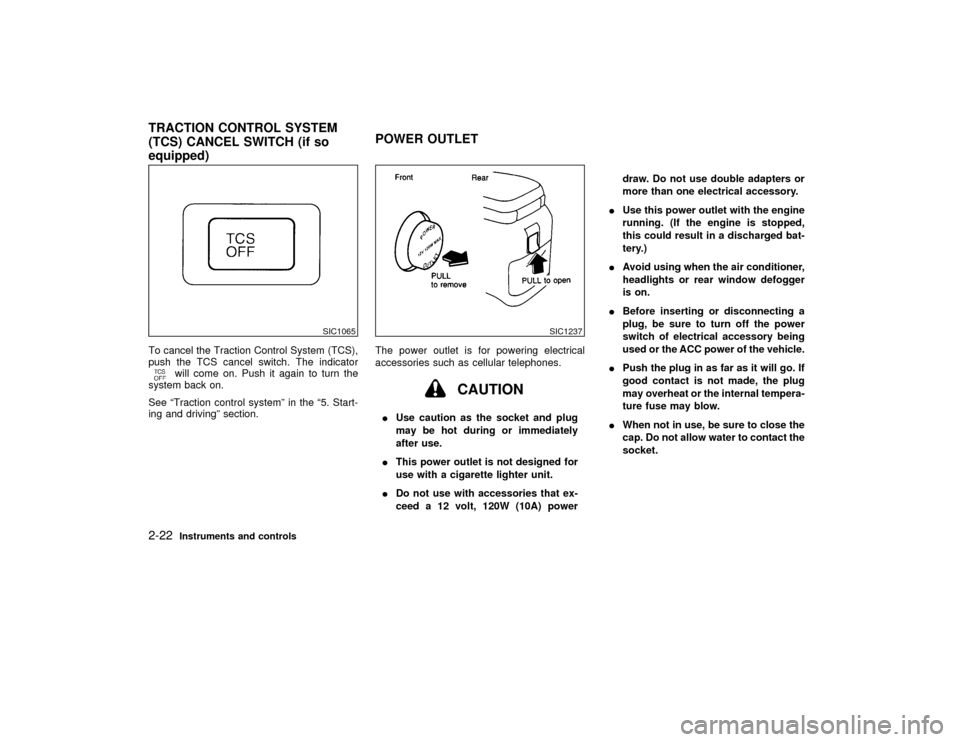2000 NISSAN MAXIMA phone
[x] Cancel search: phonePage 4 of 239

NISSAN CUSTOMER CARE PROGRAM
NISSAN CARES ...
Both NISSAN and your NISSAN dealer are dedicated to serving all your automotive needs. Your satisfaction with your vehicle and your NISSAN
dealer are our primary concerns. Your NISSAN dealer is always available to assist you with all your automobile sales and service needs.
However, if there is something that your
NISSAN dealer cannot assist you with or you
would like to provide NISSAN directly with
comments or questions, please contact our
(NISSAN's) Consumer Affairs Department us-
ing our toll-free number:For U.S. mainland customers
1-800-NISSAN-1
(1-800-647-7261)
For Hawaii customers
(808) 836-0888 (Oahu Number)
For Canadian customers
1-800-387-0122
The Consumer Affairs Department will ask for
the following information:
Ð Your name, address, and telephone
number
Ð Vehicle identification number (on dash-
board)
Ð Date of purchase
Ð Current odometer reading
Ð Your NISSAN dealer's name
Ð Your comments or questions
ORYou can write to NISSAN with the information
on the left at:
For U.S. mainland and Alaska customers
Nissan North America, Inc.
Consumer Affairs Department
P.O. Box 191
Gardena, California 90248-0191
For Hawaii customers
Nissan Motor Corporation in Hawaii
2880 Kilihau St.
Honolulu, Hawaii 96819
For Canada customers
Nissan Canada Inc.
5290 Orbitor Drive
Mississauga, Ontario L4W 4Z5
We appreciate your interest in NISSAN and thank you for buying a quality NISSAN vehicle.
Z
00.1.17/A33-D/V5.0
X
Page 67 of 239

To cancel the Traction Control System (TCS),
push the TCS cancel switch. The indicator
will come on. Push it again to turn the
system back on.
See ªTraction control systemº in the ª5. Start-
ing and drivingº section.The power outlet is for powering electrical
accessories such as cellular telephones.
CAUTION
IUse caution as the socket and plug
may be hot during or immediately
after use.
IThis power outlet is not designed for
use with a cigarette lighter unit.
IDo not use with accessories that ex-
ceed a 12 volt, 120W (10A) powerdraw. Do not use double adapters or
more than one electrical accessory.
IUse this power outlet with the engine
running. (If the engine is stopped,
this could result in a discharged bat-
tery.)
IAvoid using when the air conditioner,
headlights or rear window defogger
is on.
IBefore inserting or disconnecting a
plug, be sure to turn off the power
switch of electrical accessory being
used or the ACC power of the vehicle.
IPush the plug in as far as it will go. If
good contact is not made, the plug
may overheat or the internal tempera-
ture fuse may blow.
IWhen not in use, be sure to close the
cap. Do not allow water to contact the
socket.
SIC1065
SIC1237
TRACTION CONTROL SYSTEM
(TCS) CANCEL SWITCH (if so
equipped)POWER OUTLET2-22
Instruments and controls
Z
00.1.17/A33-D/V5.0
X
Page 80 of 239

transmitter to HomeLink
, continue to press
and hold the HomeLinkbutton (note steps 2
through 4 under ªProgramming HomeLink
º)
while you press and re-press (ªcycleº) your
hand-held transmitter every 2 seconds until
the indicator light flashes rapidly (indicating
successful programming).
NOTE:
If programming a garage door opener, etc.,
it is advised to unplug the device during
the ªcyclingº process to prevent possible
damage to the garage door opener compo-
nents.
OPERATING THE INTEGRATED
HomeLink
UNIVERSAL
TRANSCEIVER
The Integrated HomeLink
Universal Trans-
ceiver (once programmed) may now be used
to activate the garage door, etc. To operate,
simply press the appropriate programmed In-
tegrated HomeLink
Universal Transceiver
button. The red indicator light will illuminate
while the signal is being transmitted.
PROGRAMMING
PROBLEM-DIAGNOSISIf the HomeLink
does not quickly learn the
hand-held transmitter information:Ireplace the hand-held transmitter batteries
with new batteries.
Iposition the hand-held transmitter with its
battery area facing away from the
HomeLink
surface.
Ipress and hold both the HomeLink
and
hand-held transmitter buttons without inter-
ruption.
Iposition the hand-held transmitter 2 to 5
inches (50 to 127 mm) away from the
HomeLink
surface. Hold the transmitter in
that position for up to 15 seconds. If
HomeLinkis not programmed within that
time, try holding the transmitter in another
position - keeping the indicator light in view
at all times.
If you continue to have programming difficul-
ties, please contact the NISSAN Consumer
Affairs Department. The phone numbers are
located in the Foreword of this Owner's
Manual.
CLEARING THE PROGRAMMED
INFORMATIONIndividual buttons cannot be cleared, however
to clear all programming, press and hold the
two outside buttons and release when theindicator light begins to flash (approximately
20 seconds).
ROLLING CODE PROGRAMMINGRolling code garage door openers (or other
rolling code devices) which are ªcode pro-
tectedº and manufactured after 1996, may be
determined by the following.
A. Reference the garage door opener Owner's
Manual for verification.
B. The hand-held transmitter appears to pro-
gram the Integrated HomeLink
Universal
Transceiver but does not activate the ga-
rage door.
C. Press and hold the trained HomeLink
but-
ton. If the garage door opener has the
rolling code feature, the HomeLink
indica-
tor light will flash rapidly, then remains on
after 2 seconds.
To program the Integrated HomeLinkUniver-
sal Transceiver to a garage door opener with
the rolling code feature, follow these instruc-
tions after completing the ªProgramming
HomeLink
º (the aid of a second person may
make the following procedures quicker and
easier).
1. Locate the training button on the garage
door opener motor unit. Exact location andInstruments and controls
2-35
Z
00.1.17/A33-D/V5.0
X
Page 96 of 239

4 Heater, air conditioner and audio systemsVentilators ................................................................. 4-2
Heater and air conditioner (Manual) ......................... 4-3
Controls ..................................................................... 4-3
Heater operation ....................................................... 4-4
Air conditioner operation ........................................... 4-5
Air flow charts ........................................................... 4-6
Heater and air conditioner (Automatic) (if so
equipped) .................................................................. 4-9
Automatic operation .................................................. 4-9
Manual operation .................................................... 4-10
Ambient temperature switch (AMB) ........................ 4-11Operating tips .......................................................... 4-11
Servicing air conditioner .......................................... 4-11
Audio system........................................................... 4-12
FM radio reception .................................................. 4-12
AM radio reception .................................................. 4-13
FM-AM radio with cassette player .......................... 4-14
FM-AM radio with cassette player and compact disc
(CD) player .............................................................. 4-19
Antenna ................................................................... 4-24
Car phone or CB radio ........................................... 4-25
Z
00.1.17/A33-D/V5.0
X
Page 107 of 239

Turn the ignition key to ACC or ON and press
the power on switch to turn on the radio. If you
listen to the radio with the engine not running,
the key should be turned to the ACC position.
Radio reception is affected by station signal
strength, distance from radio transmitter, build-
ings, bridges, mountains and other external
influences. Intermittent changes in reception
quality normally are caused by these external
influences.
Using a cellular phone in or near the ve-
hicle may influence radio reception quality.Radio receptionYour radio system is equipped with state-of-
the-art electronic circuits to enhance radio
reception. These circuits are designed to ex-
tend reception range, and to enhance the
quality of that reception.
However there are some general characteris-
tics of both FM and AM radio signals that can
affect radio reception quality in a moving ve-
hicle, even when the finest equipment is used.
These characteristics are completely normal in
a given reception area, and do not indicate any
malfunction in your radio system.
Remember that a moving vehicle is not the
ideal place to listen to a radio. Because of the
movement, reception conditions will constantlychange. Buildings, terrain, signal distance and
interference from other vehicles can work
against ideal reception. Described below are
some of the factors that can affect your radio
reception.
FM RADIO RECEPTIONRange: FM range is normally limited to 25 to
30 miles (40 to 48 km), with monaural (single
channel) FM having slightly more range than
stereo FM. External influences may some-
times interfere with FM station reception even
if the FM station is within 25 miles (40 km). The
strength of the FM signal is directly related to
the distance between the transmitter and re-
ceiver. FM signals follow a line-of-sight path,
exhibiting many of the same characteristics as
light. For example they will reflect off objects.
Fade and drift: As your vehicle moves away
SAA0306
AUDIO SYSTEM4-12
Heater, air conditioner and audio systems
Z
00.1.17/A33-D/V5.0
X
Page 120 of 239

Lightly wipe along the antenna with a
dampened soft cloth.If equipped with a genuine NISSAN cellular
phone, your NISSAN features a non-
directional microphone in the steering column
cover, so it is not necessary to look at or speak
directly into the microphone when calling. To
do so could detract from the driving operation
and cause an accident. See the car phone
manual for operation.
Some models are pre-wired to accept the
genuine NISSAN cellular phone. In addition,
the same model has the phone antenna built
into the rear glass window.
When installing a CB, ham radio or car phone
in your NISSAN, be sure to observe the follow-
ing cautions, otherwise the new equipment
may adversely affect the Engine control sys-
tem and other electronic parts.
WARNING
IA cellular telephone should not be
used while driving so full attention
may be given to vehicle operation.
Some jurisdictions prohibit the use of
cellular telephones while driving.IIf you must make a call while your
vehicle is in motion, the hands free
cellular phone operational mode (if
so equipped) is highly recommended.
Exercise extreme caution at all times
so full attention may be given to ve-
hicle operation.
IIf a conversation in a moving vehicle
requires you to take notes, pull off the
road to a safe location and stop your
vehicle before doing so.
CAUTION
IKeep the antenna as far as possible
away from the Engine Control Module
(ECM).
IKeep the antenna wire more than 8 in
(20 cm) away from the Multiport Fuel
Injection harness. Do not route the
antenna wire next to any harness.
IAdjust the antenna standing-wave ra-
tio as recommended by the manufac-
turer.
CAR PHONE OR CB RADIO
Heater, air conditioner and audio systems
4-25
Z
00.1.17/A33-D/V5.0
X
Page 231 of 239

A genuine NISSAN Service Manual is the best
source of service and repair information for
your vehicle. Filled with wiring diagrams, illus-
trations and step-by-step diagnostic and ad-
justment procedures, this manual is the same
one used by the factory trained technicians
working at authorized NISSAN dealerships.
Also available are genuine NISSAN Owner's
Manuals, and genuine NISSAN Service and
Owner's Manuals for older NISSAN models.In the USA:
For current pricing and availability of genuine
NISSAN Service Manualsfor the 2000 model
year, contact:
Tweddle Litho Company
1-800-639-8841
www.nissan-techinfo.com
For current pricing and availability of genuine
NISSAN Service Manualsfor the 1999 model
year and prior, see an authorized NISSAN
dealer, or contact:
Dyment Distribution Services
20770 Westwood Dr.
Strongsville OH 44136
1-800-247-5321For current pricing and availability of genuine
NISSAN Owner's Manualsfor the 2000
model year and prior, see an authorized
NISSAN dealer, or contact:
Dyment Distribution Services
20770 Westwood Dr.
Strongsville OH 44136
1-800-247-5321
In Canada:
To purchase a copy of a genuine NISSAN
Service Manual or Owner's Manual please
contact your nearest NISSAN dealer. For the
phone number and location of a NISSAN
Dealer in your area call the NISSAN Satisfac-
tion Center at 1-800-387-0122 and a bilingual
NISSAN representative will assist you.
Also available are Genuine NISSAN Service
and Owner's Manuals for older NISSAN mod-
els.OWNER'S MANUAL/SERVICE
MANUAL ORDER INFORMATION10-22
Technical and consumer information
Z
00.1.17/A33-D/V5.0
X
Page 232 of 239

11 Index
A
ABS (Anti-lock brake system) ......................... 5-19
Air bag
Warning labels........................................... 1-18
Warning light ...................................... 1-19, 2-8
Air bag system
(See supplemental restraint system) ........ 1-13
Side (See supplemental side air bag
system) ...................................................... 1-15
Air cleaner housing filter ................................. 8-17
Air conditioner
Air conditioner operation ............................. 4-3
Air conditioner service ....................... 4-3, 4-11
Air conditioner specification label .... 4-3, 10-12
Air conditioner system refrigerant and
lubrication recommendations ...................... 4-3
Heater and air conditioner controls ............. 4-3
Servicing air conditioner .............................. 4-3
Air conditioning system refrigerant and lubricant
recommendations ........................................... 10-6
Air flow charts ................................................... 4-6
Alcohol, drugs and driving ................................ 5-4
AM-FM radio with cassette player .................. 4-12
AM-FM radio with cassette player and compact
disc player....................................................... 4-12
AM-FM radio with compact disc player .......... 4-12
Ambient temperature switch (AMB), Air
conditioner ...................................................... 4-11Anchor point locations, Top tether strap ........ 1-35
Antenna
Manual ....................................................... 4-24
Power ........................................................ 4-24
Anti-lock Brake System (ABS) ........................ 5-19
Anti-lock brake warning light............................. 2-9
Appearance care
Exterior appearance care ............................ 7-2
Interior appearance care ............................. 7-4
Armrest ............................................................. 1-8
Audio system .................................................. 4-12
Automatic
Automatic transmission fluid (ATF) ........... 8-10
Driving with automatic transmission............ 5-8
Sunroof ...................................................... 2-29
Transmission selector lever lock release .... 5-9
Avoiding collision and rollover .......................... 5-3
B
Battery............................................................. 8-13
Battery replacement, (See multi-remote control
system) ............................................................. 3-7
Battery, Battery saver system ........................ 2-18
Before starting the engine ................................ 5-7
Belts (See drive belts) .................................... 8-15
Brake
Anti-lock brake system (ABS) ................... 5-19Brake and clutch fluid................................ 8-12
Brake booster ............................................ 8-21
Brake pedal ............................................... 8-20
Brake pedal check..................................... 8-20
Parking brake check ........................ 5-13, 8-20
Parking brake operation ............................ 5-13
System....................................................... 5-18
Warning light ............................................... 2-9
Break-in schedule ........................................... 5-16
Bulb check/instrument panel ............................ 2-7
Bulb replacement ............................................ 8-25
C
Capacities and recommended
fuel/lubricants .................................................. 10-2
Car phone ....................................................... 4-25
Car phone or CB radio ................................... 4-25
Cassette player (See audio system) .............. 4-16
Cassette tape operation ................................. 4-12
Catalytic converter, Three way catalyst............ 5-3
Child restraints ................................................ 1-28
Installation on front passenger seat .......... 1-36
Installation on rear seat outboard or center
positions .................................................... 1-30
Precautions on child restraints .................. 1-28
Top tether strap anchor point locations .... 1-35
Child safety ..................................................... 1-22
Z
00.1.17/A33-D/V5.0
X